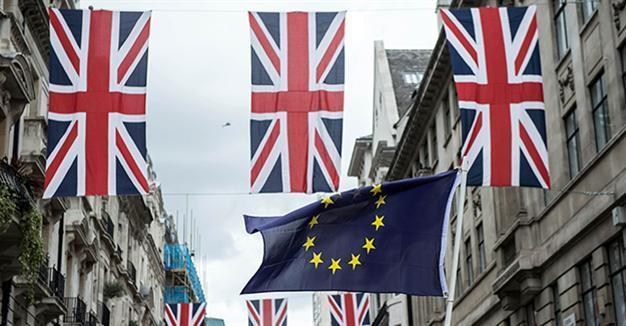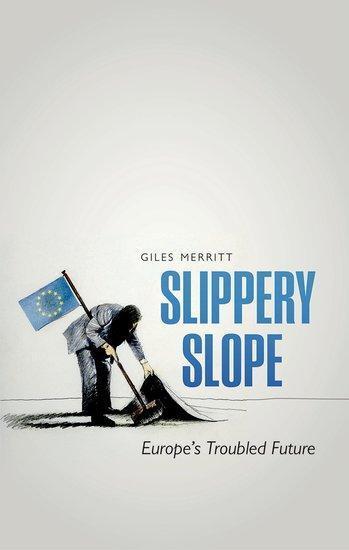Europe’s troubled future
William Armstrong - william.armstrong@hdn.com.tr

An EU flag is carried under UK flags as thousands of protesters took part in a March for Europe through the center of London on July 2, following Britain's referendum vote to leave the European Union. AFP photo
‘Slippery Slope: Europe’s Troubled Future’ by Giles Merritt (Oxford University Press, 270 pages, £17)The recent Brexit vote was welcomed with barely concealed glee among some in Turkey. The U.K.’s decision to leave the EU is seen by many within Europe and elsewhere as a sign that Brussels is crumbling. A sense of crisis, if not yet complete collapse, has been reinforced even among optimists in Europe.

“Slippery Slope” by Giles Merritt was published just before the referendum. A former Brussels correspondent of the Financial Times, Merritt is a veteran journalist who describes himself as both a Eurosceptic and a Europhile. “I don’t think we Europeans have any choice but to unite more closely, but I have long been skeptical about some of the ways the EU conducts itself,” he writes. This book is part of a burgeoning genre of “wake-up Europe” treatises aiming to rouse the continent from a slow sleepwalk to oblivion.
More than 60 years ago, Belgian statesman Paul-Henri Spaak said of the early stirrings of European integration: “There are only two types of state in Europe; small states, and small states that have not yet realized they are small.” Whatever populist nationalists say, the case for shared European destiny is irrefutable. But in recent years that destiny has looked shabby. Speaking at the European Parliament in Strasbourg in 2014, Pope Francis observed that “Europe seems somewhat elderly and haggard … feeling less and less a protagonist. The great ideas that inspired Europe have been replaced by the bureaucratic technicalities of its institutions.” Rightly or wrongly, the mood among a rising number of citizens across Europe is that the EU represents costs not benefits.
This crisis of confidence coincides with a relative decline in the position of Europe in the global pecking order. Europeans may still have the highest standard of living in the world, but they face problems adapting their comfortable 20th century lifestyle to the rigors and uncertainties of tomorrow. Recent decades have seen the rise of the rest. In the quarter century since 1990 the world’s poorest countries have seen substantial progress that goes far beyond simple GDP growth. Doom-laden news headlines tell a different story, but globally there have been huge advances in health, education and overall wellbeing in recent decades. (Sceptics should check out
the motherload of data on these trends compiled by
Max Roser of Oxford University.)
Europeans are wrong to see these shifts in zero-sum terms. The rise of other parts of the world does not automatically mean the absolute decline of Europe. “The world economy isn’t a cake that has to be cut into smaller pieces to accommodate newcomers to the feast,” Merritt writes. “Or if it is a cake, it’s one that grows with every baking and can offer bigger slices and new opportunities for all.” Asia’s rise in a globalized economy does not simply come at the expense of all others - it is a far more complex process. But explaining this to European voters and their elected politicians is tough. The mistaken idea that countries compete in the same way as companies is deeply rooted.
The key is to manage the process of relative decline sensibly. “Resenting Asia’s rise, or even trying to resist it, is fruitless and self-defeating. Europe’s strategy must be to cooperate so closely with Asian businesses that their success will be Europe’s too,” Merritt suggests. “If Europeans can keep their balance on the slippery slope, they will retain much of their wealth in a thriving global economy. Decline relative to rising living standards elsewhere will be acceptable. But if decline becomes absolute rather than just relative, Europe will suffer economic stagnation and social discontent.”
Demographics and immigration are central to Merritt’s strategy for revitalizing Europe. The OECD has long warned that the working age populations of EU countries are set to dwindle. Without immigration, the number of people in Europe available for work is projected to shrink by 68 million by 2050. At present there are four working-age people for every retired person in Europe, but without radical intervention by mid-century there will be just two workers per pensioner. “The costs of supporting such a dramatic change in the structure of European society clearly dwarf the costs of bringing in more immigrants and integrating them,” Merritt writes. Current resistance to welcoming desperate refugees is not only morally dubious, it is also catastrophically short-sighted, motivated by short-term political calculation rather than long-term strategy.
Elsewhere, Merritt makes sensible recommendations for institutional reform streamlining the EU. But forcing such necessary changes in such a cumbersome institution is difficult. The challenges that the EU faces must be confronted together, but myopic member states continue to view membership in narrow terms of perceived national interest. “Europe’s salvation lies in economic and political integration,” Merritt writes. “Yet the tide is running strongly against further integration. Public opinion has turned against Europe, and people increasingly say they prefer the devil they know in the shape of national politics to the devil they don’t, which is decision-making in far-off Brussels.”
Before the U.K. voted to quit, former Foreign Minister William Hague
wrote an op-ed outlining a vision of a more flexible EU. In one optimistic scenario, the U.K. and Turkey would be on an outer ring of a less centralized, multi-speed Europe. It is not clear how cohesive cross-European decision-making on key issues could combine with decentralization. But change certainly has to come. The only alternative is collapse, which may satisfy the populists but will not be in anyone’s long-term interests.
*Follow the Turkey Book Talk podcast via iTunes here, Stitcher here, Podbean here, or Facebook here.

 “Slippery Slope” by Giles Merritt was published just before the referendum. A former Brussels correspondent of the Financial Times, Merritt is a veteran journalist who describes himself as both a Eurosceptic and a Europhile. “I don’t think we Europeans have any choice but to unite more closely, but I have long been skeptical about some of the ways the EU conducts itself,” he writes. This book is part of a burgeoning genre of “wake-up Europe” treatises aiming to rouse the continent from a slow sleepwalk to oblivion.
“Slippery Slope” by Giles Merritt was published just before the referendum. A former Brussels correspondent of the Financial Times, Merritt is a veteran journalist who describes himself as both a Eurosceptic and a Europhile. “I don’t think we Europeans have any choice but to unite more closely, but I have long been skeptical about some of the ways the EU conducts itself,” he writes. This book is part of a burgeoning genre of “wake-up Europe” treatises aiming to rouse the continent from a slow sleepwalk to oblivion.